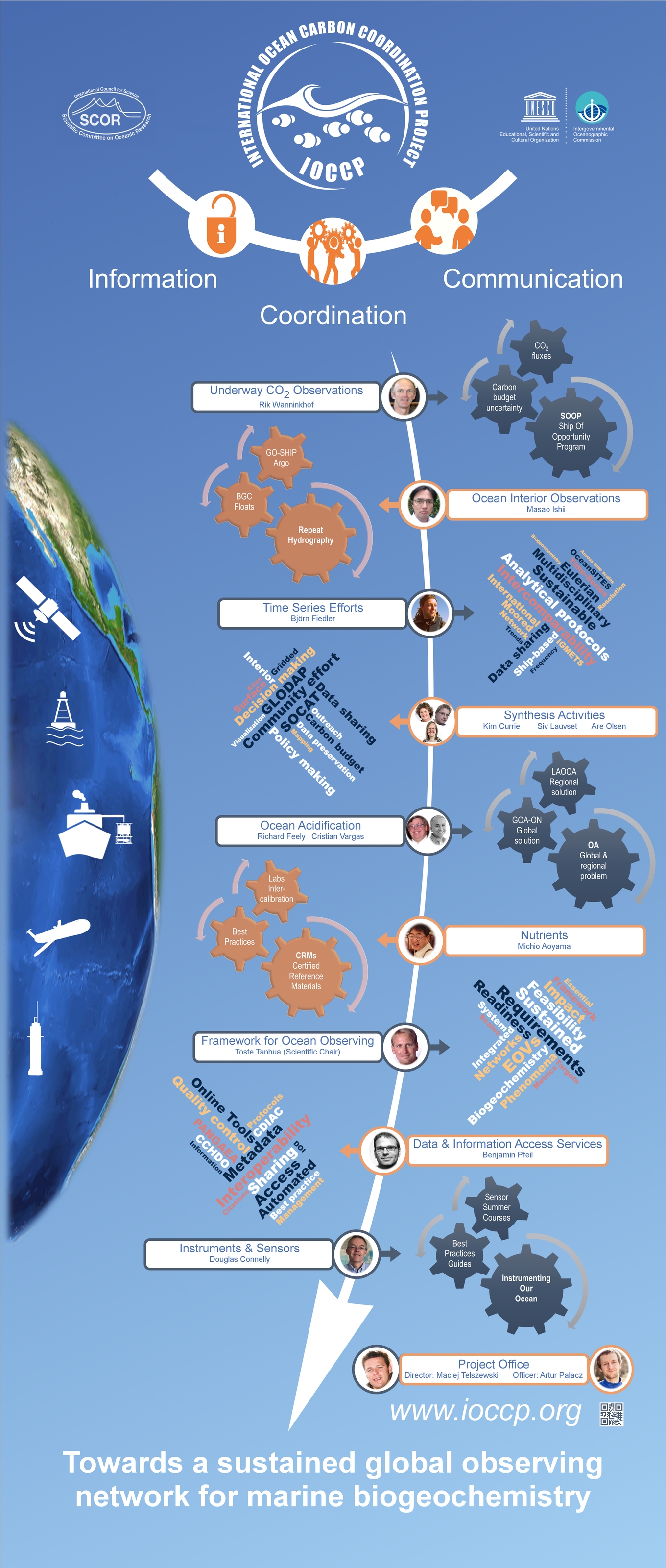In line with our Group’s mission to move towards a sustained global observing network for marine biogeochemistry, a large portion of our Group’s activities revolves around providing international science communication and coordination services via the International Ocean Carbon Coordination Project’s (IOCCP; www.ioccp.org) Office which is made up entirely of our group, with Maciej serving as Project Director and Dominik as Project Officer. In addition, Artur and Dominik are providing partial coordination and communication support to the Integrated Marine Debris Observing System (IMDOS; www.imdos.org) which aims to establish global coordination of marine debris observations and data management to enable scientific assessments and policy applications.
Below please find a summary of the key tasks and duties performed by our Group as members of the IOCCP Project Office and GOOS Secretariat:
- Developing IOCCP program priorities and coordinating the highly diverse set of ocean carbon activities (e.g. ocean acidification, repeat hydrography, underway pCO2 observations, surface and interior ocean synthesis activities, data products, standards and methods) through extensive coordination and dialogue with the scientific community via national and international organizations, scientific steering committees, scientific workshops, and expert meetings
- Organizing and implementing targeted workshops to promote the development of a global network of ocean carbon observations, including workshops to reach agreements on global strategies, data sharing practices, and best practices and standards, and ensuring that data from individual programs are comparable globally
- Facilitating data collection, management, data product development, and archival of ocean carbon and related data, by assisting regional and global data syntheses, facilitating the development of historical data bases for ocean carbon, and ensuring long-term data availability through archival of data sets beyond the lifetime of individual research projects;
- Maintaining an international directory of ocean carbon activities through the development and maintenance of web-based compilations and syntheses of ocean carbon observations and research activities, and through e-mail and web-based newsletters and other publications;
- Working with national and international research and observation programs to promote and document the development and status of a sustained ocean carbon observing system in the framework of the Global Ocean Observing Systems;
- Serving as a liaison between research activities and national governments, as well as the United Nations' conventions and other intergovernmental and non-governmental mandates relevant to the ocean's role in the global carbon cycle, including sequestration and ocean acidification;
- Liaising with atmospheric and terrestrial carbon programs to promote the integration of ocean carbon into earth system studies and global integrated observations (e.g. Integrated Carbon Observation System (ICOS) and Regional Carbon Cycle Assessment and Processes (RECCAP));
- Producing outreach material for the research community and stakeholders including workshop;
- Reports, scientific summaries for policymakers, guides and manuals on best practices and regular written updates to the Global Carbon Project (GCP), U.S. Ocean Carbon and Biogeochemistry Program (OCB), Surface Ocean Lower Atmosphere Study (SOLAS), and the Scientific Committee on Oceanic Research (SCOR).
|
 |
